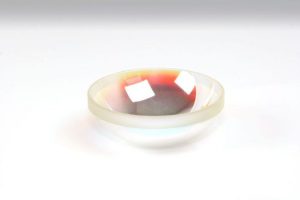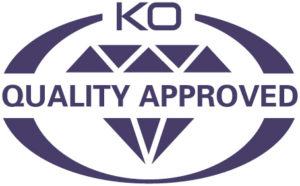The Importance of Selecting High-Quality Optical Components for R&D Labs in Defence & Aerospace
31st Jul 2023In the fast-paced environment of thriving R&D divisions stands a common denominator: the relentless pursuit of excellence. Amidst the hustle and bustle, a simple yet frequently overlooked, quality-driven factor holds the power to make or break a venture’s success. The weight of picking top-tier optics cannot be overstated, notably for the breakthroughs of tomorrow and in the dynamic spheres of the armed forces and aeronautics. Having accumulated more than three decades of familiarity in these domains, Knight Optical is in a prime position to provide insightful perspectives on why opting for premium is pivotal.
 Despite the financial appeal, especially to purse-tightened procurement managers, cheap, below-par parts can generate significant adverse effects on R&D branches for several reasons. We’ve gained a deep awareness of the repercussions of labs making use of optics that fail to serve intended purposes. Fortunately, we’ve intervened in such situations, rectifying incorrectly specified elements sourced from elsewhere and assisting in realigning projects by supplying highly compatible alternatives. Across the years, we’ve encountered challenging accounts highlighting the magnitude of misspecified consequences. To delve deeper, let us begin by addressing the primary areas of concern – pricing and time.
Despite the financial appeal, especially to purse-tightened procurement managers, cheap, below-par parts can generate significant adverse effects on R&D branches for several reasons. We’ve gained a deep awareness of the repercussions of labs making use of optics that fail to serve intended purposes. Fortunately, we’ve intervened in such situations, rectifying incorrectly specified elements sourced from elsewhere and assisting in realigning projects by supplying highly compatible alternatives. Across the years, we’ve encountered challenging accounts highlighting the magnitude of misspecified consequences. To delve deeper, let us begin by addressing the primary areas of concern – pricing and time.
Behind Schedule, Over Budget
Buying low-grade, unfit components can end in a failure to fulfil precise specifications, bringing delays in timelines and unavoidable expenditure overruns.
Of course, replacing or upgrading unsatisfactory parts incurs additional expenses, disrupting project schedules and budgets and creating waste.
Considerations to Keep in Mind
When on the lookout for a distributor, it is fundamental to prioritise one offering top-performance optics and boasting proven credibility. These pledges rest in the realm of Metrology Labs and Quality Assurance (QA) Departments. Familiarising yourself with the testing procedures and general protocols of anticipated suppliers is important.
 Additionally, it is advisable to analyse ratings, accessible through platforms including Google, and view case studies to gain an understanding of a provider’s calibre of clients. While confidentiality agreements may restrict disclosure of in-depth details, web pages often offer a glimpse of expertise and capabilities. On the other hand, direct interaction via phone allows for a meaningful conversation to assess whether shortlisted names acquire the necessary abilities and knowledge to successfully cooperate with you and address unique needs.
Additionally, it is advisable to analyse ratings, accessible through platforms including Google, and view case studies to gain an understanding of a provider’s calibre of clients. While confidentiality agreements may restrict disclosure of in-depth details, web pages often offer a glimpse of expertise and capabilities. On the other hand, direct interaction via phone allows for a meaningful conversation to assess whether shortlisted names acquire the necessary abilities and knowledge to successfully cooperate with you and address unique needs.
Compromised Efficiency
Another element to give thought to is that ill-suited optics could introduce inefficiencies, which can result in issues; for example, higher energy consumption, increased heat generation or suboptimal transmission, leading to decreased optimisation and potential constraints. Alternatively, you may endure frequent breakdowns, system malfunctions, and, linked to the previously pointed out monetary concerns, amplified maintenance and repair costs.
Considerations to Keep in Mind
 Alongside the aforementioned Met lab and QA department mentions, documented cases and reviews, be sure to probe for a source with a vast catalogue. An organisation capable of delivering custom optics will likely possess diverse substrates personalised for ultraviolet (UV), visible, and infrared (IR) functionalities. Furthermore, the availability of bespoke optical coatings can, in certain instances, enhance efficiencies. Enquire about the range of coatings on offer and request modified guidance that caters to the conditions of your application.
Alongside the aforementioned Met lab and QA department mentions, documented cases and reviews, be sure to probe for a source with a vast catalogue. An organisation capable of delivering custom optics will likely possess diverse substrates personalised for ultraviolet (UV), visible, and infrared (IR) functionalities. Furthermore, the availability of bespoke optical coatings can, in certain instances, enhance efficiencies. Enquire about the range of coatings on offer and request modified guidance that caters to the conditions of your application.
Safety First
Dependability and precision are of the highest priority in the military and aviation markets. Employing inferior-grade components can present safety risks; for instance, compromising the accuracy of targeting systems, surveillance equipment or communication devices, which can have grave implications.
Considerations to Keep in Mind
 Incorporating the recommendations above, it is also advisable to proactively identify a company that aligns with sector-specific demands. Particularly in defence, adherence to MIL-STD (commonly referred to as ‘MIL-SPEC’) becomes imperative. Teaming up with an establishment whose personnel have undergone rigorous training in accordance with MIL-SPEC criteria assures the guarantee of receiving quality-assured components that undergo thorough assessment tailored to your field. This instils confidence and reassurance in the purchasing process.
Incorporating the recommendations above, it is also advisable to proactively identify a company that aligns with sector-specific demands. Particularly in defence, adherence to MIL-STD (commonly referred to as ‘MIL-SPEC’) becomes imperative. Teaming up with an establishment whose personnel have undergone rigorous training in accordance with MIL-SPEC criteria assures the guarantee of receiving quality-assured components that undergo thorough assessment tailored to your field. This instils confidence and reassurance in the purchasing process.
Negative Impact on Research
R&D facilities in national security and space exploration fields rely heavily on accurate and reliable components to conduct experiments, tests, simulations and final fully functioning applications. Using inadequate optics can certainly raise uncertainties, inaccuracies, and limitations in investigative outcomes, hindering progress and possibly provoking flawed conclusions.
Considerations to Keep in Mind
Undoubtedly, QC significantly contributes to this aspect. Nevertheless, it is equally essential to seek a firm that portrays a profound understanding of the significance of advancements and remains abreast of emerging technologies and innovations. Providers who remain entrenched in outdated techniques may stagnate, impeding output. Collaborating with a forward-thinking company that embraces contemporary developments can prove advantageous in terms of supply and when seeking indispensable know-how and opinions.
Reputational Damage
 A corporation’s image is crucial in any line of work, particularly in military and aviation. Working with a dependable vendor chain ensures higher quality, reliability, compliance, risk mitigation, innovation, and trust. Substandard components in the optical sector can harm the track record of labs, contractors or manufacturers. This can lead to a loss of client, partner and stakeholder faith, potentially impacting future opportunities.
A corporation’s image is crucial in any line of work, particularly in military and aviation. Working with a dependable vendor chain ensures higher quality, reliability, compliance, risk mitigation, innovation, and trust. Substandard components in the optical sector can harm the track record of labs, contractors or manufacturers. This can lead to a loss of client, partner and stakeholder faith, potentially impacting future opportunities.
Considerations to Keep in Mind
When assessing reputations, consider the following factors:
- Experience: Find out how long the company has been operational and liaising with your industry
- Certifications and standards: Information on business accreditations, such as ISO 9001 (quality management), ISO 14001 (environmental management), and the standards they work to should be available
- Testimonials: As mentioned, many companies are under strict NDAs; however, some have endorsements on websites or social media channels, providing valuable insights into their operations
- Customisable solutions: As well as a wide-ranging portfolio, a good supplier will be able to meet your exact requirements with custom-made optics
- Customer service: Review feedback to gauge the level of customer service provided. Working with a brand known for its exceptional service will simplify your day-to-day interactions.
- Partnerships: A supplier that gets involved in industry associations demonstrates its commitment to the sector, best practices, and professional development. For the aerospace and defence sectors, look for links to trade alliances like the UK-based ADS Group.